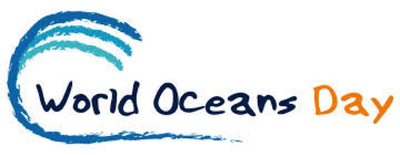by Anna Folz
UN Conference on World Oceans Day – 8 June 2013

If we are to fully benefit from the oceans, we must reverse the degradation of the marine environment due to pollution, overexploitation and acidification.
Secretary-General Ban Ki-moon
Many countries celebrated World Oceans Day following the United Nations Conference on Environment and Development, which was held in Rio de Janeiro in 1992. In 2008, the United Nations General Assembly decided that 8 June would be officially designated as “World Oceans Day”. According to the UN website, “The official designation of World Oceans Day is an opportunity to raise global awareness of the challenges faced by the international community in connection with the oceans.“ According to the United National Educational, Cultural and Scientific Organization (UNESCO), “World Oceans Day is a time to celebrate our common treasure, which makes the Earth habitable for people by providing and regulating the climate, weather, oxygen, food and many other environmental, social and economic benefits. The oceans are the lungs of our planet, providing most of the oxygen we breathe, and serving as a major source of food and medicines and are a critical part of the biosphere. The ‘blue economy’ of the ocean is central to our daily lives: at least one in four persons rely on seafood as their primary source of protein.” Clearly, we must all work together to protect this vital natural resource. The theme for events planned for 2013 World Oceans Day is “Together, We Have the Power to Protect the Ocean.”
In observance of World Oceans Day 2013, the Division for Ocean Affairs and the Law of the Sea in the Office of Legal Affairs at the United Nations hosted a conference with opening remarks made by Ms. Patricia O’Brien, Under-Secretary-General of Legal Affairs. Dr. Alex De Voogt and Dr. Jennifer Newell from the American Museum of Natural History served on the panel with the Director of the Division for Ocean Affairs serving as the moderator.
Dr. De Voogt began the discussion with a presentation on “The Confluence of Games in the Indian Ocean”. His focus was not on the sustainability of the oceans but highlighted the historical use of the oceans. He stated that throughout history, different cultures have navigated the world’s waterways, taking their leisure activities, such as games with them. As cultures intermingled, there was an evolution of games. Dr. De Voogt stated that if a person studies the rules of the game held in a particular culture, we can understand something about the world in which the people lived. We can also observe how other cultures played the game and can then understand the evolution of the game itself. The intermingling of cultures can be observed by studying the evolution of games played by those cultures. This sharing of games was the result of people traveling across the seas. It is important that we protect the oceans, so that the intermingling of cultures can continue.
Dr. Jennifer Newell discussed how climate change is affecting those that live in the Pacific Islands. The small islands of the Pacific depend heavily on the ocean and waterways surrounding them. The water has shaped their way of life. Dr. Newell said, “In many ways it is ironic that these small islands live so naturally, contributing the least to the changes in climate, but they are the most effected. “The temperature of the water has changed which has decreased biodiversity significantly in and around the Pacific Islands. For centuries, the Pacific Islanders have learned the names of specific marine animals and understood their behavior patterns and life cycles. The people of the Pacific Islands understand and know weather patterns, as they have existed for centuries. But with the changes in climate, much of the world around them is changing. Many of the marine animals have decreased significantly in number or can no longer be found at all. Islanders now observe species of marine life that were never seen before. Weather patterns have changed bringing more dramatic storms including greater numbers of hurricanes and devastating tsunamis. Dr. Newell claims that as the waters warm, the Pacific Island cultures are dying. The Islanders are unable to maintain their traditional ways of life. She says that because of the religious belief systems, the Pacific Islanders blame themselves for these unfortunate events. They believe that their surroundings are changing because they have started to accept western ideas and have distanced themselves from their traditions.
Both Dr. Voogt and Dr. Newell concluded that it is vital that we protect our oceans and water systems. Both agree that cultures are negatively affected by the degradation of the seas
In addition to the panel discussion held on 8 June, there is a photography exhibit titled “Oceans” which is on display in the UN Visitors Center from 8 June through mid-August. This exhibit features stunning underwater photography and videos by 16 photographers, divers and photojournalists from nine countries. The exhibition highlights the ecological and economic importance of healthy oceans, as well as the need to protect their fragile ecology and submarine life. In honor of World Oceans Day, the Empire State Building was lighted in white, blue and purple, symbolizing the different layers of the ocean. This occurred during the evening of 8 June.
And God said, “Let there be a dome in the midst of the waters, and let it separate the waters from the waters.” So God made the dome and separated the waters that were under the dome from the waters that were above the dome. And it was so. God called the dome Sky. And there was evening and there was morning, the second day. And God said, “Let the waters under the sky be gathered together into one place, and let the dry land appear.” And it was so. God called the dry land Earth, and the waters that were gathered together he called Seas. And God saw that it was good.